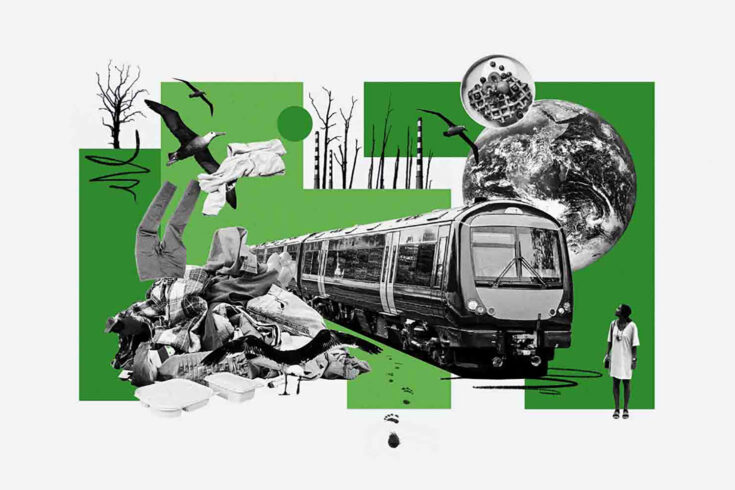I’m the first to say I’m not perfect when it comes to my or my family’s carbon footprint. We take the train when we can. We think about food miles and where our clothes come from, we plant our garden with pollinators in mind. We have only one car and we debate whether to change it for an electric vehicle and when. We know our house needs better insulation and are planning for it.
We’re probably similar to many families who really want to do something about climate change. Often, it’s not easy to do, there are so many factors and trade-offs. We all need infrastructure and support in place to help us.
Many organisations find themselves in the same place, including in research and innovation. We know UK Research and Innovation (UKRI) has more to do. We have lots of great work going on across UKRI and also have lots more action we can take before we can say we are the best example of an organisation on the road to net zero.
I’m very pleased we have an increasingly robust plan setting out all the measures we must take to get to net zero by 2040. I think that together we can achieve that aim.
We are pushing at an open door
I think we are pushing against an open door in research and innovation. Everyone I talk to across our sector wants to do something about climate change.
And we have been talking a lot to people across different universities, research organisations and funders about net zero targets and what those working in research and innovation are doing and can do together now and in the future.
We’ll be going out to institutions such as universities, fellow funders and research organisations with a proposed agreement or concordat on net zero and wider environmental sustainability later this year. We hope everyone will sign up to a set of principles and priorities to help us take action across our sector.
Change will help us to stay world-leading
We in research and innovation do the climate science that tells us how our planet is changing. In my view we need to listen to that science and adapt how we do our research and innovation in a way that reduces our impact and in a way that is consistent with what we know about climate change and damage to the environment and biodiversity.
I think adapting and finding new ways of delivering great and environmentally sustainable research and innovation is the wise thing to do. If we want to remain world-leading, we must do our research and innovation in new ways and share those widely, both in our sector and more broadly with business and wider communities. We have the skills and capabilities to do it.
We could, of course, get to net zero by doing less. We don’t want that. The science and innovation are valuable so we must ask: how do we do it differently?
These are the kinds of principles we will be asking people to agree on.
I see lots of good across the UK
For example, the University of Oxford has a new environmental sustainability strategy that aims to achieve net zero carbon and biodiversity net gain by 2035.
The University of Edinburgh was the first with a climate conscious travel policy, Leicester University are doing some great stuff with their local community. The University of Nottingham has built a new carbon neutral chemistry laboratory. It’s unfair just to pick out these three (but also important to share real examples) as the list of things I have heard happening across the UK, in Scotland, in Wales, in urban communities and in rural locations is very impressive. We can learn a lot from each other.
Planning for a net zero research infrastructure
UKRI has a programme. We have a new travel policy, we have a responsible supplier charter, and we have a carbon offset statement.
We have also looked at our research infrastructure, the buildings, ships, planes and equipment, and asked how we get them to net zero by 2040. It’s a plan and we expect this to work through into our spending activities over the coming years.
We will also be working out our carbon budget. That is a challenge and our first step will be to set good baselines so we can use this as an effective tool, just as we would financial management. The concordat is likely to help us with those baselines.
We are also putting funding into studies and opportunities that will help all of us along this road to net zero.
For example, the Natural Environment Research Council (NERC) has launched a 12-month scoping study that is looking at how future marine science can move its infrastructure, such as ships, to net zero.
The Engineering and Physical Sciences Research Council has an open funding opportunity for research into sustainable digital technologies.
Our Science and Technology Facilities Council colleagues are researching how to generate ammonia using only renewable energy sources. Ammonia is a promising carbon-free fuel source of the future and so if successful has the potential to considerably advance the UK’s net zero ambitions.
All our councils are developing their responses to the different challenges in their particular field.
We tread this path together
We always talk about our convening power at UKRI. This is our ability to bring together people from across the research and innovation community in a common effort.
That’s what we are trying to do. I am putting the final touches to a draft of the concordat and looking forward to hearing what you all think about it.
Ultimately, by the end of the year, we expect to be one of many signatories to a concordat that we all agree on and own together.
One of my great inspirations is David Attenborough. Who was not moved by the ‘Blue Planet’ sequence in which albatross chicks are fed plastics by their parents?
Attenborough has done more than most to challenge us about the way we treat this planet and to urge us to change. He is also hugely optimistic about our ability to change and solve these global issues together.
I share that optimism. I believe we can take the research and innovation we do so well, shine it back on ourselves and find practical ways to change how we do that science and innovation. It is a path we and our partners must tread together.




